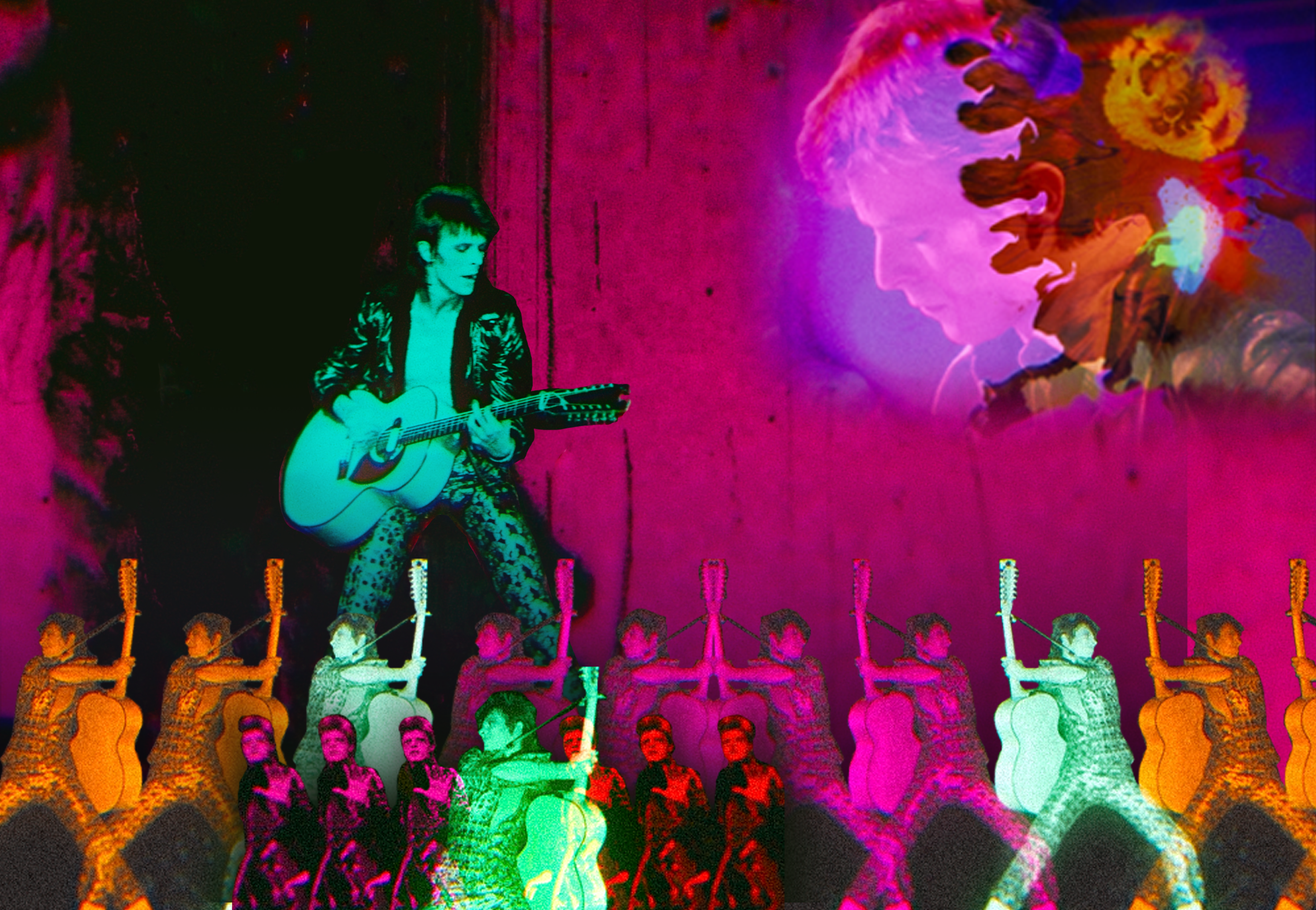There are two things movie goers can’t seem to get enough of: superheroes and rockstars.
Over the past five years, we’ve witnessed considerable proof of the latter, as a recent swell of musician biopics—most notably Dexter Fletcher and Bryan Singer’s Bohemian Rhapsody (2018) and Fletcher’s Rocketman (2019)—takes over our hearts, minds, and wallets.
The tried-and-true pattern of these movies never ceases to amaze: The heartbreak, the childhood anguish, the inter-band tension, and (of course) the near-constant renderings of the artist’s greatest hits thrill us every time. After a press release by Neon and Universal Pictures, it seems like David Bowie, who forever changed the landscape of rock ’n’ roll and remains an enduring presence as both artist and subject, is going to be the next musical icon in line to receive Hollywood’s biopic treatment.
But never fear: Director Brett Morgen ensures that Moonage Daydream (2022) is nothing like its formulaic predecessors. This isn’t only because it’s a documentary. Unlike its peers, Daydream isn’t a biography at all. In this film, narrative doesn’t just take a backseat to style; it’s not even allowed in the car.
Daydream is Bowie in his own words, literally: The first film to be officially sanctioned by the artist’s estate, every segment is handpicked from over five million clips of archival footage. Priority isn’t given to performance, though; a video of Bowie howling along to “Suffragette City” could easily be cut short in favor of an interview with MTV or a candid moment inside his home. A diverse array of Bowie’s music—including both popular favorites like “Modern Love” and deeper cuts like “Hallo Spaceboy”—is artfully remastered and arranged throughout the film. Morgen collaborates beautifully with his special effects and sound teams, poring over thousands of hours of concerts, press conferences, and private insights to sculpt a feature-length film that displays Bowie in all his neon-outlined glory.
Bowie’s thoughts, philosophies, personalities, and identities are fully on display, because this film, like Bowie himself, contains multitudes. But these elements are never communicated directly, or even clearly; most scenes are non-linear, fragmentary, and seemingly impossible to understand. It unapologetically refuses to connect any dots for the audience, stitching together clips that are often years apart and peppering in songs seemingly at random. This is an intentional choice made by Morgen, meant to reflect the artist’s own love of the inexplicable. But the chaos, however purposeful, sometimes inhibits the viewing experience. A slightly more structured film, one that is loosely chronological or thematic, would allow viewers the framework to better understand what Morgen is trying to convey.
Bowie’s music gained acclaim for being as baffling as it was powerful; the film’s title is a nod to his song of the same name, one whose lyrics are notoriously impossible to understand. Bowie’s lyrics are often abstract: “Time takes a cigarette, puts it in your mouth,” or even absurd: “I’m a laughing gnome and you don’t catch me.” This mysterious, impenetrable quality lies at the heart of Bowie’s otherworldly allure, and Daydream’s director understands that.
“I don’t know what a ‘moonage daydream’ is per se,” Morgen admits in an interview with Time Magazine. “But the fact that I don’t really know what it means is kind of the beauty of Bowie: he’s the unknowable.”
David Bowie, at his core, defies definition. This applies not only to his music, but to all forms of expression. He openly vaunted his bisexuality—a difficult thing to do in the early ’70s—and frequently wore makeup, high heels, and skin-tight dresses. His identity itself was fluid, as he constantly shifted between fantastical personas like Ziggy Stardust, Aladdin Sane, Halloween Jack, and the Thin White Duke. Daydream is at its best when it portrays Bowie’s deep-seated freedom from the societal constraints that bind the rest of us. It whispers that, if we just embody what Bowie has taught us, we could be free too.
The documentary stays true to Bowie’s bizarre and amorphous style; at times, it seems like it could’ve been directed by the man himself. It’s visually jarring: Scenes are painted over with flashing lights and the transitions are lightning-fast. Often, it feels like there’s some bored teen behind the projector, flipping from one channel to the next before the audience can react. In another film, focused on a different artist, this might have seemed unwise. For Moonage Daydream, it’s perfect.
This is because, even in the cacophony, pieces of Bowie shine through.
While the film is too fragmented to confidently claim a theme, there are a handful of powerful, albeit ephemeral, ideas that persist throughout. His relationship with his second wife Iman, showcased in a tasteful arrangement of wedding photos put to “Word on a Wing,” feels as authentic and profound as any. Similarly, Bowie’s love of life, especially in the face of nihilism, is palpable for the entirety of the film—it seems to drive everything he does. “Make the best of every moment,” his voice intones. “We’re not evolving. We’re not going anywhere.”
Although parts of the artist seem tangible at times, Daydream just doesn’t have the same goals that, say, Bohemian Rhapsody does. Unlike Rhapsody, which focuses on the life and loves of Queen singer Freddie Mercury, Daydream avoids biographical details in favor of displaying Bowie’s worldview, his art, and his effect on us. Fans itching to learn more about Bowie’s personal life are likely to be disappointed.
Even after sitting through the movie’s 134-minute runtime, the audience never truly meets David Bowie, the human being—the living, breathing man behind the music. They’re too dazzled by his magic to get a very good look.
Toward the beginning of the film, a voice asks, “Who is he? What is he? Where did he come from? Is he a creature of a foreign power? Is he a creep? Is he dangerous? Is he smart? Is he dumb? Nice to his parents? Real? Put on? Crazy? Sane? Man? Woman? Robot? What is this?”
In the end, this question is never answered—and maybe it shouldn’t be.







